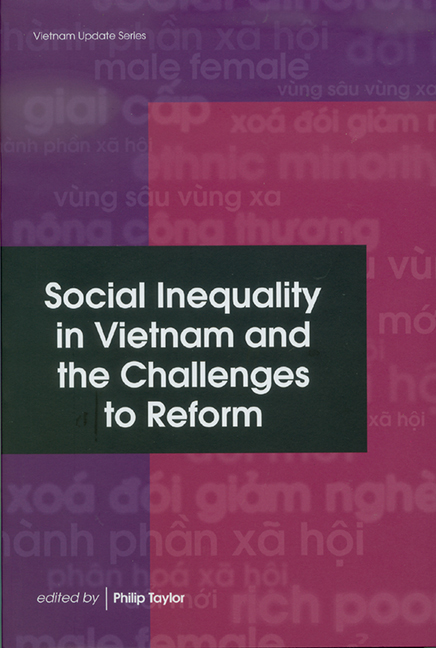Book contents
- Frontmatter
- Contents
- List of Tables
- List of Figures
- Preface
- Introduction: Social Inequality in a Socialist State
- 1 Vietnam's Recent Political Developments
- 2 Vietnam's Recent Economic Reforms and Developments: Achievements, Paradoxes, and Challenges
- 3 Behind the Numbers: Social Mobility, Regional Disparities, and New Trajectories of Development in Rural Vietnam
- 4 From Collectivization to Globalization: Social Differentiation in a Muong Ethnic Community of Vietnam
- 5 Political Capital, Human Capital, and Inter-generational Occupational Mobility in Northern Vietnam
- 6 Social Disparities in Vietnam: The Case of Poverty Reduction and Educational Attainment
- 7 Redressing Disadvantage or Re-arranging Inequality? Development Interventions and Local Responses in the Mekong Delta
- 8 The Politics of Land: Inequality in Land Access and Local Conflicts in the Red River Delta since Decollectivization
- 9 Female Garment Workers: The New Young Volunteers in Vietnam's Modernization
- 10 Class, Nation, and Text: The Representation of Peasants in Vietnamese Literature
- 11 Leisure and Social Mobility in Ho Chi Minh City
- Index
- About the Contributors
- Publications in the Vietnam Update Series
8 - The Politics of Land: Inequality in Land Access and Local Conflicts in the Red River Delta since Decollectivization
Published online by Cambridge University Press: 21 October 2015
- Frontmatter
- Contents
- List of Tables
- List of Figures
- Preface
- Introduction: Social Inequality in a Socialist State
- 1 Vietnam's Recent Political Developments
- 2 Vietnam's Recent Economic Reforms and Developments: Achievements, Paradoxes, and Challenges
- 3 Behind the Numbers: Social Mobility, Regional Disparities, and New Trajectories of Development in Rural Vietnam
- 4 From Collectivization to Globalization: Social Differentiation in a Muong Ethnic Community of Vietnam
- 5 Political Capital, Human Capital, and Inter-generational Occupational Mobility in Northern Vietnam
- 6 Social Disparities in Vietnam: The Case of Poverty Reduction and Educational Attainment
- 7 Redressing Disadvantage or Re-arranging Inequality? Development Interventions and Local Responses in the Mekong Delta
- 8 The Politics of Land: Inequality in Land Access and Local Conflicts in the Red River Delta since Decollectivization
- 9 Female Garment Workers: The New Young Volunteers in Vietnam's Modernization
- 10 Class, Nation, and Text: The Representation of Peasants in Vietnamese Literature
- 11 Leisure and Social Mobility in Ho Chi Minh City
- Index
- About the Contributors
- Publications in the Vietnam Update Series
Summary
In the late 1950s, shortly after a radical land reform in the northern half of Vietnam, agriculture based on family household farming was gradually reorganized into collective production that took small-scale co-operatives as the main production units. From the early 1960s, agricultural collectivization increased in scale and intensity, based on three key principles: collective ownership of the means of production, centralized management of production, and equal allocation of production output on the basis of points. From the early 1980s, however, a process of decollectivizing agriculture started and continued into the early 1990s (Chu Van Lam et al. 1992). This process went alongside the development of a new land tenure system that clarified three types of substantial rights in land: rights of ownership, rights of management, and rights of use to be held by various holders. At the same time, the state has been implementing the essential programmes of industrialization and modernization in rural areas.
Decollectivization in agriculture in Vietnam has not only led to economic development and diversification but has also increased social differentiation in the countryside (Dang Canh Khanh 1991; Nguyen Van Tiem 1993; Nguyen Xuan Nguyen 1995; Tuong Lai 1995; Nguyen Van Thieu 1995; Hy Van Luong and Unger 1999). One of the aspects of this social differentiation process is inequality among various parties and institutions with regard to access to land at the local level. To this date, different patterns of inequality in land access since decollectivization have been uncovered in some parts of Vietnam. In the Mekong delta, some researchers have highlighted increasing disparities among the local population with regard to access to land use (Nguyen The Nha 1998; Nguyen Dinh Huong 1999; Bui Van Trinh 2000). In Tay Nguyen, scholars have also illustrated the situation in which a large number of indigenous people have lost most or all of their land and forest resources to the hands of the state plantations and new individual comers (Dang Nghiem Van 2002; Vu Dinh Loi 2000).
- Type
- Chapter
- Information
- Social Inequality in Vietnam and the Challenges to Reform , pp. 270 - 296Publisher: ISEAS–Yusof Ishak InstitutePrint publication year: 2004

